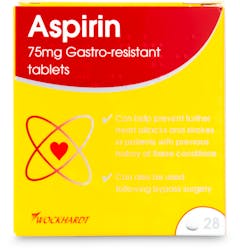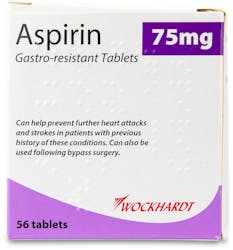Almus Dispersible Aspirin 75mg 28 Tablets
Almus Dispersible Aspirin 75mg 28 Tablets
What 500,000+ customers say about medino:
Get notified when back in stock
Description
Meet Almus Dispersible Aspirin 75mg 28 Tablets, a medical strategy aimed at lessening the likelihood of subsequent heart attacks, strokes, and issues post-bypass surgery. These fast-dissolving tablets offer a swift means to ingest a 75mg aspirin dose. Acting as an antiplatelet, the aspirin hinders the blood cells from clumping and clot formation. Adults 16 years and above can safely use them.
Key Features
- Shields against subsequent heart attacks and strokes for those with past incidents.
- Recommended post-bypass surgery.
- Quick-dissolving tablet form ensures ease of use.
- Each tablet packs 75mg of aspirin.
- Not recommended for pain alleviation; a dosage of 300mg aspirin is the go-to for pain management.
- Each pack offers 28 fast-dissolving tablets.
What advantages come with Almus Dispersible Aspirin 75mg 28 Tablets?
Almus Dispersible Aspirin 75mg 28 Tablets act to shield against more heart attacks, strokes, and post-bypass surgery complications. Its antiplatelet properties minimize blood clot risks.
What's the function of Almus Dispersible Aspirin 75mg 28 Tablets?
Aspirin, the primary component in Almus Dispersible Aspirin 75mg 28 Tablets, acts as an antiplatelet. It ensures blood cells don't clump together, thereby preventing clot formation.
Are side effects a concern with Almus Dispersible Aspirin 75mg 28 Tablets?
Some might experience side effects like indigestion or a heightened bleeding tendency. Rarer side effects include itchy skin rashes, nasal discharge, or breathing difficulties.
What insights does research provide about Almus Dispersible Aspirin 75mg 28 Tablets?
Extensive research has confirmed aspirin's efficacy in preventing heart attacks, strokes, and post-bypass surgery complications. Its ability to deter blood clot formation is well recognized.
What does Almus Dispersible Aspirin 75mg 28 Tablets contain?
Each fast-dissolving tablet incorporates 75mg of aspirin as its primary component.
How should Almus Dispersible Aspirin 75mg 28 Tablets be consumed for pain relief?
It's worth noting that aspirin 75mg isn't meant for pain relief. A 300mg aspirin dose is typically advised for managing pain.
Is a daily intake of Almus Dispersible Aspirin 75mg 28 Tablets considered safe?
While often prescribed for prolonged periods, particularly for those prone to clotting, always ensure aspirin 75mg is consumed daily only if a doctor recommends it.
Can pregnant women consume Almus Dispersible Aspirin 75mg 28 Tablets?
In some cases, healthcare professionals might advise taking aspirin 75mg during the initial pregnancy stages. Nonetheless, always confer with a healthcare expert before taking any medication during pregnancy.
Ingredients
Active ingredient: Aspirin 75mg
Other ingredients: Please read the patient information leaflet for the full list of ingredients.
Usage and Instructions
Refer to the enclosed leaflet for comprehensive instructions. Confirm with your physician that this medication is appropriate for you before using it for the first time. Avoid taking this medicine unless your GP specifically recommends it.
Ensure the foil is intact before using it for the first time; if broken, do not consume that tablet.
Adults aged 16 and older may take one tablet daily for prevention against heart attack, stroke, or angina.
Your doctor might suggest a higher dose in certain situations. If so, adhere strictly to their guidance and never exceed the prescribed amount.
Ingest the tablet whole with a glass of water. Refrain from cutting, chewing, or crushing it, as the tablet is gastro-resistant, a design meant to prevent breakdown in the stomach, thus minimising side effects.
Children under 16 years should not take this medication, except when specifically advised by a medical professional.
Warnings
Avoid taking aspirin 75mg unless explicitly advised by your doctor. It is typically prescribed as a precaution if you have recently experienced a heart attack, angina or stroke, or if you are at risk. Sometimes, your GP or midwife might recommend it during the first trimester of pregnancy.
These tablets are not for those under 16 years, unless under specific medical guidance.
Before taking aspirin 75mg, consult with your GP or a pharmacist if you are on other medications or herbal supplements. Some substances may alter your blood consistency, thus interacting with aspirin and either increasing the likelihood of side effects or diminishing the medicine's efficacy.
Since this is a medicine, it is essential to discuss with your doctor or pharmacist if you have any underlying medical issues, are on other medications or complementary therapies, or if symptoms continue.
Should you have any surgery lined up, including dental procedures, inform the healthcare provider that you are taking aspirin, as they may advise a temporary halt to prevent potential bleeding.
Refrain from taking these tablets if you are allergic to aspirin or related medicines, pregnant or breastfeeding, have or previously had a stomach ulcer, experienced bleeding in the stomach or elsewhere, have gout, a blood clotting disorder, or are on blood-thinning medications, or if you suffer from severe kidney or liver conditions.
Side Effects
One common side effect of aspirin, owing to its blood-thinning properties, is an increased likelihood of bleeding.
More infrequent side effects include thrombocytopenia, granulocytosis, and aplastic anaemia.
Aspirin may cause stomach irritation; if this occurs, consider using the gastro-resistant form like the one presented here.
Should you experience any unusual bruising or bleeding, such as gum bleeding, please contact your GP or speak to one of our pharmacists promptly.
While other side effects are extremely rare, a comprehensive list of all side effects and their commonality is detailed in the enclosed leaflet.
Be aware that symptoms may persist for 4–8 days after discontinuing aspirin. This information is particularly crucial if you have surgery planned, as the heightened risk of bleeding may lead to anaemia in some instances.
Lastly, if you experience any allergies from taking aspirin, seek professional medical guidance.






